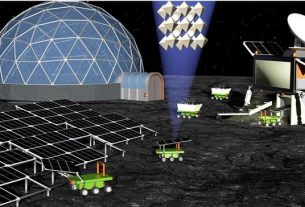With the COP-28 global climate summit coming up in Dubai, the TV channel that I work with, WION, asked if I would do a report on water shortages in West Asia. West Asia is the same region as the Middle East, it just has a different name depending on where you are based in the world. WION asked if there was a good story to tell from Israel about water.
Is there a good story to tell? The story is incredible, but first let’s look at the facts…
July was officially the hottest month on record that our planet has ever seen. According to United Nations figures, 55 million people are already affected by droughts. Temperatures are predicted to get even hotter, with 700 million people expected to be at risk of being displaced by 2030 as a result of these droughts. By 2050, it is thought that one in four people are likely to experience recurring water shortages. The Middle East and North Africa (MENA) is the most severely affected region, with seven out of the 10 most water-stressed nations located here.
There are a number of causes for this water stress. As well as drought, the causes can include poor water infrastructure and management, deforestation, unsustainable farming practices, and pollution. The good news is that tracing the man-made causes can also mean there is potential for man-made solutions. And that is where Israel comes in.
From desert to global leader in water management
Israel consists of 60% desert with only one freshwater source: the Kinneret, otherwise known as the Sea of Galilee.
Despite this – or perhaps because of this – infrastructure development, initiatives to encourage people to save water, and “blue and white” water tech have led to Israel’s becoming a world leader in water management. Israel’s rate of non-revenue water (NRW) stands at only 5% compared to a global average of 20%. NRW means water lost before it reaches consumers; for example, through water leaks. This has been achieved by real-time data monitoring throughout water distribution systems, covering issues like water quality, pressure, and flow rates. The data is then analyzed using artificial intelligence (AI) to optimize water resources.
A number of Israeli companies are playing leading roles in improving water management. Water network monitoring and management company Takadu, for instance, uses AI to detect leaks and predict water system maintenance work – assisting customers in Australia, North America, South America, and Europe. Similarly, IOsight’s advanced AI is installed in over 100 water and energy arenas worldwide, including tailored solutions for water utilities supporting more efficient water networks. Kando’s sensor technology uses AI to offer insights into wastewater quality and pollution, assisting industry and municipalities in eight global markets in its water management. Additionally, remote AI monitoring solutions firm Ayyeka collects and analyses water infrastructure data, supporting decision-making across the world, such as the US, Europe, and South America, as well as the Middle East.
From wastewater recycling to desalination, drip irrigation, and education
Other areas in which Israel excels are in wastewater recycling and desalination. Israel’s recycling rate is nearly 90%, reusing the water for industrial and agricultural purposes. In 2022, some 85% of Israel’s drinkable water was produced through desalination. AI is set to increase water recycling rates and improve recycled water quality even further. It is also expected to make the desalination process more efficient, eco-friendly, and cost-effective going forward; for example with the capacity to minimize energy consumption and forecast equipment failures.
Israeli companies have also led the way when it comes to drip irrigation. Netafim, for instance, is a leader in precision agriculture, supporting farmers in growing more crops with less water. The company is already present in 110 countries and recently signed a memorandum of understanding (MOU) with United Arab Emirates firm E20 Investment to promote further sustainable agriculture practices internationally. Furthermore, the use of AI in smart agriculture is set to increase, making an even greater difference. AI-powered irrigation systems are expected to become more widespread, closely monitoring a number of factors, such as the weather, crop health, and soil moisture, and ensuring that just the right amount of water is delivered exactly where it is needed.
In addition, education plays a key role in saving water across the country. This starts young – even in kindergarten – with kids given water-saving tips like turning off the tap when they brush their teeth. Drip irrigation is common even on balcony gardens, and water is kept front of mind throughout the summer, with the TV news updating people on the latest Kinneret levels. In the home, too, AI is expected to play an increasing role, offering more consumers real-time insights into their water use to help them save water and money.
Water is playing a role in Israel’s diplomatic efforts, too
It struck me that the countries with the highest water stress levels include Egypt, Bahrain, and the UAE, all of which have now signed normalization agreements with Israel. Water is definitely playing a significant part in Israel’s diplomatic efforts, particularly in the Abraham Accords and Negev Forum. Jordan and the Palestinian Authority, too, have several joint committees to look into water management issues. At COP28, Israel, the UAE, Jordan, and the US are expected to sign the final details of a solar water deal, whereby Jordan will receive desalinated water from Israel in exchange for Israel receiving energy from solar panels in Jordan.
Water also features highly in the I2U2 initiative, involving Israel, India, the US, and UAE. At the request of Indian Prime Minister Narendra Modi, India hosts Israel’s first (and so far only) water attaché anywhere in the world. In this role is Dr. Lior Asaf, who has over 20 years of experience in various environmental fields associated with groundwater, surface water, soil investigation and remediation, environmental monitoring, and environmental impact analyses. His role involves engaging with key stakeholders on these issues, sharing knowledge and facilitating training and capacity building across India.
“With climate change altering water availability, AI is poised to be a vital tool for modeling and predicting future water supply challenges,” says Asaf. “Proactive planning and adaptation become possible, ensuring water security in an ever-evolving climate landscape.” Furthermore, he suggests that “Israel’s water expertise transcends borders, fostering international collaborations and knowledge sharing, thereby promoting sustainable water practices on a global scale.”
Water – conflict or cooperation?
As well as water stress, the Middle East grapples with multiple conflicts. Some of these conflicts are creating refugee crises, which are making water shortages even more acute. According to the UN, the MENA region already has 15.7 million refugees. This includes 6.9 million internally displaced people in Syria and 4.5 million refugees in Yemen. With COP28 fast approaching, sustainability experts are sounding the alarm for greater cooperation among countries – particularly those dealing with refugee crises – to increase resilience, adaptation, and mitigation efforts.
Going forward, many experts suggest that while water stress could be a future cause of conflict, the opposite is also true. Collaboration on water could also serve as a bridge for peace because while conflicts are often over boundaries, drought doesn’t recognize borders.
The writer is Middle East Correspondent for India’s WION (World Is One) TV news channel. The author of Tikkun Olam: Israel vs COVID-19, she has helped numerous multinationals report on their contributions to tackling the UN’s Sustainable Development Goals. On Twitter: @JodieCohen613.




